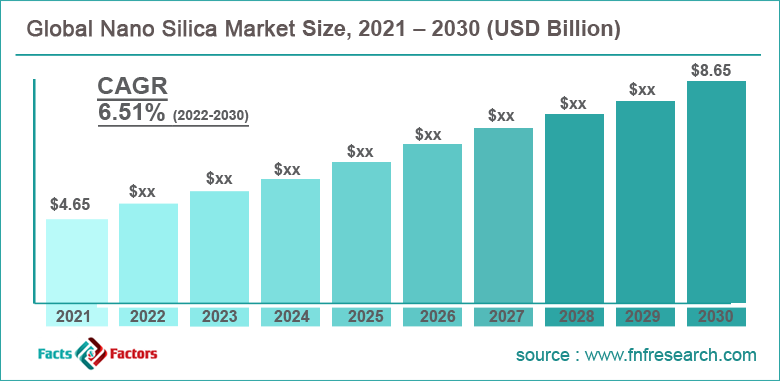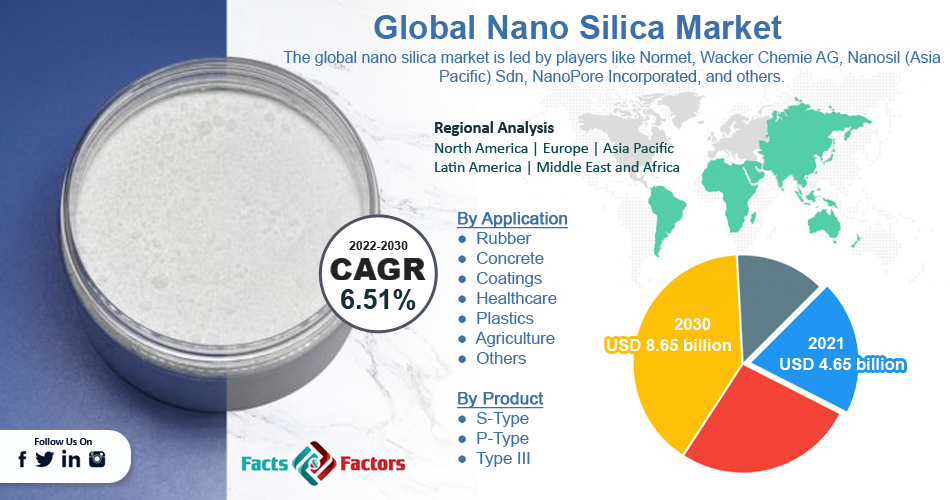Search Market Research Report
Nano Silica Market Size, Share Global Analysis Report, 2022 – 2030

Nano Silica Market Size, Share, Growth Analysis Report By Application (Rubber, Concrete, Coatings, Healthcare, Plastics, Agriculture, and Others), By Product (S-Type, P-Type, and Type III), and By Region - Global and Regional Industry Insights, Overview, Comprehensive Analysis, Trends, Statistical Research, Market Intelligence, Historical Data and Forecast 2022 – 2030
Industry Insights
[233+ Pages Report] According to the report published by Facts Factors, the global nano silica market size was worth around USD 4.65 billion in 2021 and is predicted to grow to around USD 8.65 billion by 2030 with a compound annual growth rate (CAGR) of roughly 6.51% between 2022 and 2030. The report analyzes the global nano silica market drivers, restraints/challenges, and the effect they have on the demands during the projection period. In addition, the report explores emerging opportunities in the nano silica market.

 Market Overview
Market Overview
Silicon dioxide or silica nanoparticles (SiNPs) are substances that can be found in amorphous states and showcase spherical phases. They can be produced in various shapes and sizes depending on the final application. When used in the non-porous form, they are absorbent and abrasive but when the mesoporous form of silica nanoparticles showing hexagonal pore structure are used, they can be applied in drug applications and nanomedicine. The most abundantly available material found in Earth’s crust include silicates and natural silica in crystalline form.
Silica nanoparticles exhibit excellent heat resistance, biocompatibility, massive supply in synthetic form, and simple synthetic approach, the biological applications of these particles have grown multifold in the last few years. They constantly feature in research & development activities owing to the versatility displayed by the mineral, especially in the pharmaceutical industry. This is exactly why the future for nano silica looks extremely bright as more investments are expected in the field. Silica nanoparticles are the most preferred items amongst the other nanoparticles for other applications as well including energy creation from the light because of the presence of crystalline lattice created by the connection of the silicon atoms.
 Key Insights
Key Insights
- As per the analysis shared by our research analyst, the global nano silica market is estimated to grow annually at a CAGR of around 6.51% over the forecast period (2022-2030)
- In terms of revenue, the global nano silica market size was valued at around USD 4.65 billion in 2021 and is projected to reach USD 8.65 billion, by 2030.
- The market is projected to grow at a significant rate due to the growing applications for drug delivery in the healthcare sector
- Based on product segmentation, P-Type was predicted to show maximum market share in the year 2021
- Based on application segmentation, rubber was the leading application in 2021
- On the basis of region, North America was the leading revenue generator in 2021

 Growth Drivers
Growth Drivers
- Growing applications in drug delivery mechanisms to attract more revenue
The global nano silica market is projected to witness a high CAGR due to the growing applications of silica nanoparticles in the healthcare industry especially to improve drug delivery mechanisms. Mesoporous materials are nanoparticles with pores showcasing a diameter, not between 2 nanometers to 50 nanometers. Mesoporous silica alongside surface functionalized silica has found wide applications in carrying and delivering genes and drugs amongst patients.
In this process, the nanoparticles are required to provide a site for the drug molecules while also making use of gold nanoparticles to act as caps required for closing the pores. Certain types of molecules will be required to break the existing covalent bonds and to open the pores when required. To conjugate with the genes, functionalized silica nanoparticles will require good conjugation. As the DNA molecules exhibit a negative charge, nano silica particles have to be charged positively.
 Restraints
Restraints
- Presence of small amounts of toxic compounds to restrict market expansion
As the world is watching growing interest in silica nanoparticles, there is growing pressure on the medical community to invest in thorough research to learn about the mineral in-depth and to establish step-by-step processes to eliminate the toxic compounds present in nano-silica, especially when they are in the biomedicine processes. The silica nanoparticle cytotoxicity can be greatly influenced by factors like the shape, surface area, size, dose, and type of cell used in the research. Some of the common problems are the existence of caseation and hemolysis which limits the effectiveness of the drug and jeopardizes the safety of the patients.
 Opportunities
Opportunities
- Promising outlook for application in tumor detection to provide growth opportunities
The global nano silica market players may witness growth opportunities in the coming years owing to silica nanoparticles showing promising results for their application in nano-based tumor detection alongside use for cancer treatment. Currently, various methods are employed to detect tumors in patients like ultrasound, positron emission tomography (PET) scan, and others.
Sometimes, these methods may not be as effective as required and in such cases, the developments in the field of nanoparticles are projected to act as an encouraging factor. Various pharmaceutical companies have proposed more research and the subsequent use of nano-silica in different cancer therapies. Mesoporous silica nanoparticles are deemed as acting as excellent drugs or deoxyribonucleic acid carriers along with applications in the tracking of fluorescent cells.
 Challenges
Challenges
- Restricted improvement in the mechanical properties of concrete to act as a major challenge
The global market players face challenges in terms of proving the worth of investment in silica nanoparticles when they are used in the manufacturing of concrete structures. Studies have shown that even though they have proven excellent improvement in improving the concrete’s durability, the mechanical properties of the final product remain largely unaffected making the material partially useful in comparison to the number of resources invested.
 Segmentation Analysis
Segmentation Analysis
The global nano silica market is segmented based on application, product, and region.
Based on application, the global market segments are rubber, concrete, coatings, healthcare, plastics, agriculture, and others. In 2021, the highest revenue generated in the global market was by the rubber segment and the same trend is expected to be continued in the future. The compound is used extensively in the manufacturing process of various types of rubbers including nitrile rubber (NBR), styrene-butadiene rubber (SBR), ethylene acrylic rubber (AEM), and ethylene propylene diene monomer (EPDM). Nano silica is used to improve the properties of vulcanized rubber by playing its role as a reinforcing agent. With the use of silica nanoparticles, the rubber’s tensile strength can be increased from 0.35 megapascals to 14 megapascals.
Based on product, the global market divisions are S-type, P-type, and type III. S-type refers to silica nanoparticles that have spherical shapes whereas P-type are porous particles. P-type registered the highest CAGR in 2021 due to the growing applications in the construction industry to create concrete. As the requirement for residential and commercial buildings grow, the demand for P-type is expected to increase simultaneously. India registered as foreign direct investment in the construction industry at 29 billion in April 2022.
 Recent Developments:
Recent Developments:
- In August 2022, Iranian scientists developed an ultra-thin silicon nanoparticle with applications in solar cell technology and showed an efficiency rate of 11%. Different configurations and structures of nano silica were considered to achieve this result
- In December 2022, Nanoscale journal reported the discovery of a new technique making use of raspberry-shaped silica nanoparticles for drug delivery
 Report Scope
Report Scope
Report Attribute |
Details |
Market Size in 2021 |
USD 4.65 Billion |
Projected Market Size in 2030 |
USD 8.65 Billion |
CAGR Growth Rate |
6.51% CAGR |
Base Year |
2021 |
Forecast Years |
2022-2030 |
Key Market Players |
Normet, Wacker Chemie AG, Nanosil (Asia Pacific) Sdn, NanoPore Incorporated, and others. |
Key Segment |
By Application, Product, and Region |
Major Regions Covered |
North America, Europe, Asia Pacific, Latin America, and the Middle East &, Africa |
Purchase Options |
Request customized purchase options to meet your research needs. Explore purchase options |
 Regional Analysis
Regional Analysis
- US to lead the North American market during the forecast period
The global nano silica market is anticipated to witness the highest growth in North America with the US leading with the highest regional market share. The high revenue is projected to be driven by the increasing investments in nanotechnology across research departments in the country. In the last 20 years, the US government has invested over 38 billion in nanotechnology for which nanoscience and particles are inseparable parts. The growing emphasis on the development of effective drugs may lead to more investments in the coming year.
The growing number of players producing silica dust or quartz dust is another contributing factor. NanoPore Incorporated is a leading player in the market headquarters in the US and it registered a revenue boost of 17% in 2021. The European market may be driven by the growing interest of the scientific community in understanding if silica in nano forms can be used in the cosmetics industry.
 Competitive Analysis
Competitive Analysis
- Normet
- Wacker Chemie AG
- Nanosil (Asia Pacific) Sdn
- NanoPore Incorporated
The global nano silica market is segmented as follows:
 By Application Segment Analysis
By Application Segment Analysis
- Rubber
- Concrete
- Coatings
- Healthcare
- Plastics
- Agriculture
- Others
 By Product Segment Analysis
By Product Segment Analysis
- S-Type
- P-Type
- Type III
 By Regional Segment Analysis
By Regional Segment Analysis
- North America
- The U.S.
- Canada
- Mexico
- Europe
- France
- The UK
- Spain
- Germany
- Italy
- Nordic Countries
- Denmark
- Sweden
- Norway
- Benelux Union
- Belgium
- The Netherlands
- Luxembourg
- Rest of Europe
- Asia Pacific
- China
- Japan
- India
- Australia
- South Korea
- Southeast Asia
- Indonesia
- Thailand
- Malaysia
- Singapore
- Rest of Southeast Asia
- Rest of Asia Pacific
- The Middle East & Africa
- Saudi Arabia
- UAE
- Egypt
- South Africa
- Rest of the Middle East & Africa
- Latin America
- Brazil
- Argentina
- Rest of Latin America
Industry Major Market Players
- Normet
- Wacker Chemie AG
- Nanosil (Asia Pacific) Sdn
- NanoPore Incorporated
Frequently Asked Questions

Copyright © 2025 - 2026, All Rights Reserved, Facts and Factors


